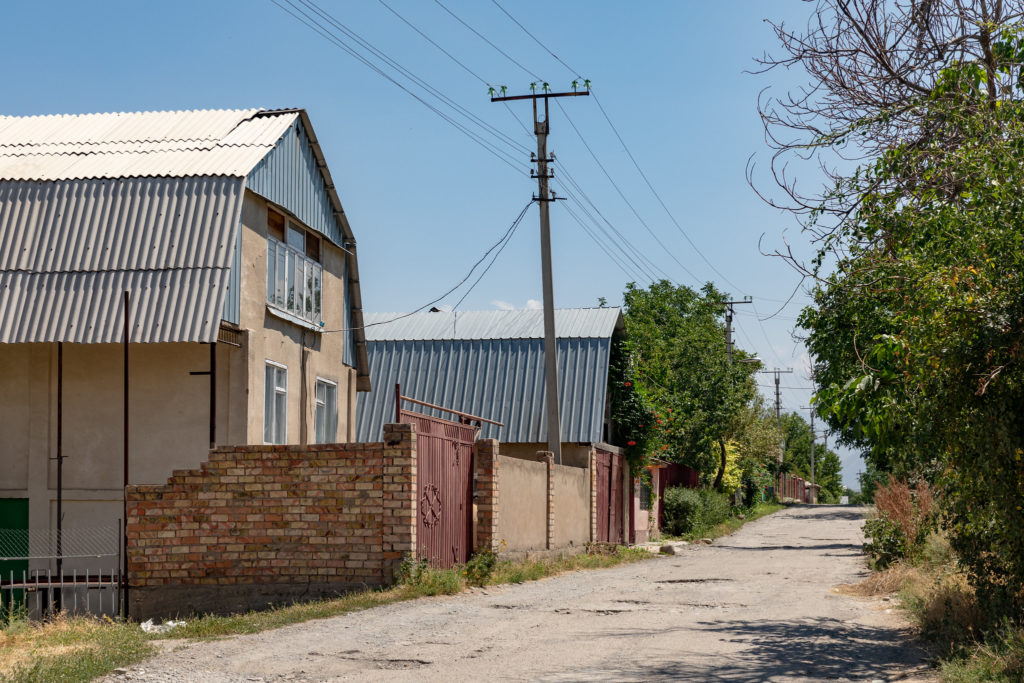Urban spaces in Bishkek, including pedestrian areas and public transportation, remain uncomfortable for citizens, especially women, leaving them feeling vulnerable and insecure due to a lack of facilities, poor pedestrian infrastructure, and inadequate pathways. Urmat Karybaev, the head of the State Administration for Architecture and Urban Planning of Bishkek, announced the plan to build a cable car in the city. But this measure alone will not solve everything.
Officials have been promising to build a subway for many years – with no result
Despite the government’s attempts to bring more buses to the city, public transportation is struggling to handle the demand. City activists in the urban initiative Peshkom raise awareness about the pedestrian environment saying that during peak hours, when most people need to commute, the situation becomes even more challenging, with transportation services becoming completely overwhelmed. However, in one of the interviews for the local news outlet KaktusMedia, the deputy mayor of Bishkek Jyrgalbek Shamyraliev said that the construction of the subway is a very expensive and complex construction. The municipality has rejected the idea of building the subway in the city. Instead, they are considering transportation that will run on a cable road.
During the first Eurasian Symposium on Architecture, Urban Planning, and Design, ESAUD-2023 Urmat Karybaev, the head of the State Administration for Architecture and Urban Planning of Bishkek announced that they are planning to build a cable car network. Karybyev noted that the construction of a cable road is several times cheaper than the building of motorways or railways; it occupies a minimum of land areas; it does not require the construction of the associated infrastructure, and, in addition, it is an environmentally friendly and reliable mode of transport. Social media, however, took the words of Karybaev not seriously and reacted with jokes and memes.
Pedestrian areas in Bishkek
An urban expert in the urban initiative Peshkom, Anna Schumbria believes that Bishkek public spaces are primarily designed with the assumption that men will be the primary beneficiaries. This leaves women feeling vulnerable and insecure due to differences in how they perceive and experience urban spaces compared to men.
Women in Bishkek face various challenges in public spaces, including poor lighting and a lack of convenient public toilets. These obstacles limit women’s freedom of movement, particularly given the prevalence of dark streets in the city. Public toilets are designed with an equal number of cabins for men and women, despite the fact that women have different needs related to menstruation and pregnancy. This leads to longer queues for women’s toilets, and it is especially difficult for women who are usually responsible for children and have nowhere to leave them while using the facilities. These problems were raised during the “Tender City” by young activists during the urban conference in Bishkek.
“There’s a big problem with women’s toilets. For example, when they are designed into buildings, they have the same number of cabins for men and women. Although women have menstrual periods, they become pregnant and need more time to go to the toilet. But it is still not taken into account directly. Most of the time, the responsibility for the children lies with the woman. And when a woman with a baby comes to the toilet, she has nowhere to leave the baby.” – said an activist from Peshkom organization at the “Tender City” conference in October 2022.
Mothers also face uncomfortable situations while taking their babies for a walk due to a lack of facilities, poor pedestrian infrastructure, and inadequate pathways. ”It is extremely uncomfortable to use the city because you have to take a stroller by yourself all the time. The stroller is about 4 kg, and the baby is about 12 kg. Also, when you go underground, you have to carry all the stuff because the stairs are very straight and it is very dangerous since you can just fall with your baby and all the other stuff.” – shared one of the women in a survey.
Public transportation in Bishkek
Cholpon Turdalieva, a gender expert and professor at the American University of Central Asia shared her research experience in Bishkek transport mobility: “I think here the concept of safety in public spaces in Bishkek is also correlated with the social, educational, and family status of women… [I]f I conclude, it’s more dangerous than safe, but it also depends on these patterns as social status, educational background, and professional background.”
According to Turdalieva, in Bishkek, “marshrutkas” (minibuses) and buses frequently lack proper equipment, such as ramps or lifts, that would allow women with strollers to board with ease. This also presents an issue for other groups of people, such as people with disabilities. During rush hours the situation becomes even more challenging, with transportation services becoming completely overwhelmed. This creates an environment where passengers, especially young women, are at risk of being subjected to harassment and unwanted touching. These experiences are incredibly traumatic and have lasting effects on the mental health and well-being of the victims.
According to Anara, a 22 years old college student, (name was changed to keep respondent’s anonymity – edit.) she faces harassment in marshrutka on a daily basis. “We have a really bad transport system, especially marshrutkas. And especially in those marshrutkas, there is a lot of harassment and even violence against women. It happens all the time. We cannot do anything about it because they are almost always full and there is not enough space to stand far from each other, so that’s why men make excuses, saying that it is a tight place and I didn’t intend to touch you.”
Another respondent, a school teacher, shared her thoughts saying, “I think this is also related to upbringing, where girls are told not to draw attention to themselves, not to dress provocatively, not to provoke. Instead of saying that there should be no harassment from men’s side and no victim-blaming. I don’t know about now, but this idea was cultivated earlier in our minds that girls should dress in a way that doesn’t attract men’s attention.”
Cable car: the solution?
So can cable car solve the massive problem with the current transportation system in Bishkek? According to Urmat Karybaev, the head of the State Administration for Architecture and Urban Planning of Bishkek, cable cars are being called tourist transport, but in many cities they are already used for regular public transportation. One cable car can replace 2,000 cars and 100 buses to carry 3,000-4,000 passengers. However, the population remains sceptical: for many years, officials have been promising to act – first with the idea to build a subway, then – a monorail. These promises traditionally remain in words, and one of the main problems is still the deplorable situation on the roads of Bishkek.
 Insecurity, Harrassment, and Lack of Inclusion: Young Women’s Experiences with Safety in Bishkek public spaces
Insecurity, Harrassment, and Lack of Inclusion: Young Women’s Experiences with Safety in Bishkek public spaces 



